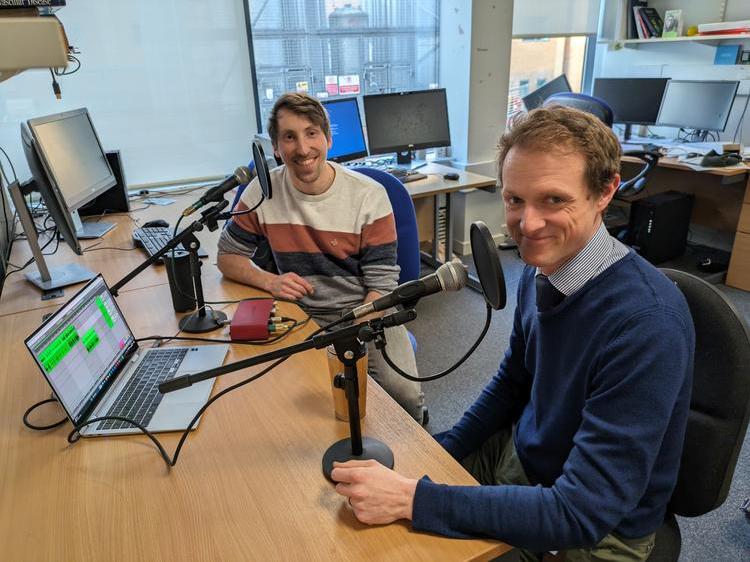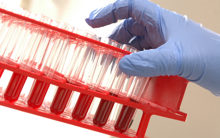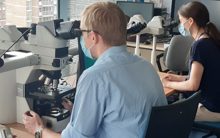Pip is an RCPath member and haematology consultant specialising in haemostasis and thrombosis (H&T). Rich is a clinical research fellow and PhD student and chair of the non-malignant haematology network HaemSTAR, which was founded by Pip in 2017.
HaemSTAR is an independent UK-wide network of registrars in clinical haematology, interested in promoting and performing research in classical haematology.
In ‘Don’t Just Read the Abstract’, the pair discuss the latest advances in non-malignant haematology with the help of expert guests. The podcast is CPD-accredited by the College.
We were delighted to interview Pip and Rich to find out more about the inspiration behind the podcast, raising the profile of non-malignant haematology and the value of continuing professional development (CPD).

To start, could you both tell us some more about yourselves – what is your background, and what drew you to haematology as a profession?
Pip: I had never considered haematology as a career until my final F2 post. In fact, I can’t remember a single haematology lecture / teaching session / clinical attachment during medical school! I’ve always had an academic-leaning and was most interested in rheumatology at medical school and then renal medicine as an F1/F2 doctor. I’ve since discovered that I’m not alone, and several other haematologists I know had this same series of career thoughts.
I first fell in love with haematology for the long-term relationships with patients and the feeling of being a one-stop-shop for presentation, diagnosis and treatment. I was fortunate enough to seize an opportunity for a PhD with Steve Watson in Birmingham, undertaking a project looking at the bleeding side effects of ibrutinib.
During this PhD I met Cheng-Hock Toh and was given the opportunity to develop, grow and lead the non-malignant haematology network HaemSTAR. This led to a love of haemostasis, thrombosis and platelet function. I now work as a consultant in H&T and immunohaematology, as well as an associate professor in a platelet research group.
Rich: At med school I undertook an 8-month lab project looking at the immune response to chronic lymphocytic leukaemia. This was back in 2012, around the time that CAR-T cell therapy was emerging. Both the lab work and seeing immunotherapy in clinical practice pointed me towards haematology.
I then did an academic clinical fellowship in haematology and failed 3-times to get PhD funding to do more cancer immunology research. At that point, I got involved with HaemSTAR and started getting really interested in thrombosis. One thing led to another, and now I’m doing a PhD with Pip on mechanisms of platelet activation in vaccine-induced immune thrombocytopenia (VITT) and heparin-induced thrombocytopenia (HIT).
What is the aim of your podcast, and why did you want to produce one in this area?
Rich: The ‘T’ in HaemSTAR stands for ‘training’ but we didn’t think we were offering enough on this. I am a huge podcast fan, and some have had a massive impact on my career. I started my own podcast in 2021, as it’s a really neat way to reach people who might not have much time to read.
There has been a lot of attention paid to the quality of clinical research and critical appraisal in malignant haematology, and there are quite a lot of podcasts out there discussing advancements and controversies. However, there is very little for non-malignant haematology, despite it being a huge and varied area of medicine. We feel that should change.
Who do you hope will listen to the podcast, and what do you want them to get out of it?
Our aim is that this will be accessible to doctors, nurses and allied health professionals. We passionately believe that critical appraisal of trials is a core skill that all healthcare professionals should be able to perform.
However, we think it’s really lacking in our training. We want to fill this much needed gap in non-malignant haematology education. So, not only are we hoping that listeners learn about the most recent advances, but that they also join us on our journey to learn more about how to critically appraise trials.

Released in January, the first episode takes a deep dive into the PACER trial: Platelet Transfusion before CVC Placement in Patients with Thrombocytopenia. Please could you explain in brief what the trial is, why it was of interest, and if you were surprised by anything you found out?
The PACER trial looked at patients who had a low platelet count (<50 x 109/L) and needed a central venous catheter insertion. They randomised them to receive a 1 unit platelet transfusion or not, and then looked at the rates of bleeding. They found a statistically significant increase in non-major bleeding in patients that had a transfusion but no difference in major bleeding (although the trial was not powered to detect differences in major bleeding).
Those are the headline findings but the real messages are a lot more nuanced. We picked this trial because the population is quite heterogeneous. Plus, there are lots of ways in which we can interpret the data and use it to influence our clinical practice. People will have to listen to the show to find out more!
This podcast has been CPD-accredited by RCPath so that, where relevant to their profession, practitioners can claim 1 CPD credit for each hour-long podcast episode. Why is CPD important to you, and why is it valuable to the pathology profession as a whole?
Medicine is changing so quickly, and it feels like that pace is ever quickening. Of course, CPD takes many forms. It’s not just formally accredited content; equally important is discussion with colleagues, particularly around challenging cases. We all have busy lives and finding time for study leave is tricky.
We think the podcast format gives colleagues a chance to leverage their time – listening while commuting or doing housework. The hour-long episodes are based on conversation rather than lectures, so are easy to digest and we hope shouldn’t contribute to burnout. We fully intend them to be relaxed and provide an easy listening experience.
What advice would you give to other pathologists who are keen to try something similar, or to expand their own professional development?
Get on and do it. There’s not really much risk attached and at the very least you will get used to the sound of your own voice! To expand your professional development, there are hundreds of relevant podcasts and I would suggest broadening your horizons. There’s a lot of content from other walks of life, like business, that is relevant to medicine.
The amount of stuff out there can be a bit overwhelming so find something you enjoy and can dip in and out of without contributing to burnout. I think the more curious you can be about what you do (e.g. the evidence behind our practice), the more interesting and fulfilling professional life becomes.
How would you like the College to support you in your ongoing professional development and career?
I think the College already provides a huge range of content to choose from. My impression is that the biggest barrier to professional development is finding time, particularly if this involves study leave. The other barrier is cost and I would like to see the College advocating for members to be fully funded and given time for important professional development so that they do not have to self-fund or look for funding from pharma.
Anything else you’d like to add?
If you would like to get involved in a HaemSTAR project, please visit the HaemSTAR website and have a look through our upcoming projects.
You can find ‘Don’t Just Read the Abstract’ on all major podcast platforms. Episodes will be released monthly.
Are you doing something similar that you’d like the College and our members to know about? If so, please get in touch with us at [email protected].







